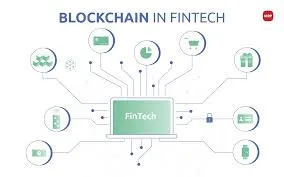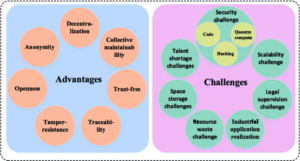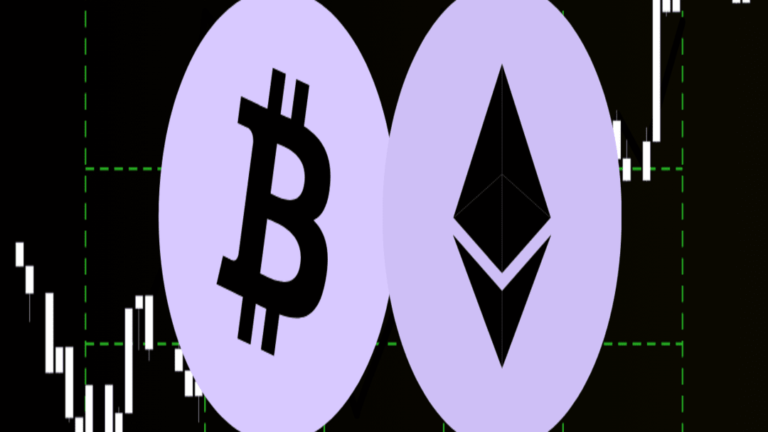What is Blockchain and Fintech?
Blockchain Technology
Blockchain is a distributed ledger technology for storing and verifying different transactions that happen on multiple computers with the help of a secure network. The chain is made up of blocks and each block holds the record of transactions that have taken place; once a block is full it is processed and linked to the previous block in the chain sequentially. It forms the bedrock of cryptos such as Bitcoin and Ethereum but is much more than that. Blockchain’s current applications are in the fields of supply chain, health care, and property where companies seek to make their processes more secure and free of fraud.
Fintech (Financial Technology)
Fintech is a concept where financial service providers employ and apply technology solutions to enhance the utilization and provision of services to customers. It is a large and continuing developing industry for individuals as well as companies. From the use of mobile phones to do banking and investments to blockchain technology and cryptocurrency, fintech has very many uses. This sector has revolutionized the financial services through cutting down the barriers, increasing the effectiveness, and enhancing the usability.
Latest Trends in Blockchain and Fintech
1. Decentralized Finance (DeFi)
DeFi remains one of the most popular trends in the modern world of blockchain technologies. Its ultimate goal is to produce an environment of financial services based on decentralization, open-sourced and permission less and fully encrypted for the public without the intermediation of any global governing body. These solutions are based on the blockchain, mainly Ethereum system. These applications cover services of lending, borrowing, trading as well as gaining interest all from an interface, and all these occur without the need for any middlemen ranging from banks to insurers. Some of the major Decentralized finance platforms currently in operation are; Uniswap, Compound, and Aave.
2. Central Bank Digital Currencies (CBDCs)
Most of the central banks around the world have considered the topic of Central Bank Digital Currencies (CBDCs). These are digital versions of national currencies that central banks would issue and control. Big countries such as china, Sweden’s and Bahamas have in one way or the other rolled out trial for their respective digital currencies. CBDCs could improve payment systems’ efficiency, lower costs, and get the unbanked population access to money. The central bank digital currency has not been much active with only the People’s Bank of China actively working on a CBDC and even developing the digital Yuan and doing trials on a large scale.
3. Non-Fungible Tokens (NFTs)
4. Blockchain in Supply Chain Management
5. Digital Identity Verification
In our world of advanced technological solutions, digital transactions are rising, making it essential to adequately identify entities. Blockchain provide solution by creating digital identities in which there is only one source of truth where information can be recorded and it cannot be changed. This makes it possible to shield personal information and will be capable of being verified.
For instance, Civic deploys blockchain in identity solving problems, especially in online banking and voting, whereas Sovrin is an otherwise solution that seeks to solve the questions of identity in the realm of blockchain.
Recent Updates in Blockchain and Fintech
Major Partnerships and Collaborations
Mastercard and Bakkt
In a major issuance, Bakkt has linked with Mastercard that would allow Bank and merchants in its chain to offer cryptocurrency in their packages.
This will let consumers’ purchase, sell, and retain their assets through custodial wallets that Bakkt provides.
In particular, Mastercard’s decision is considered as a major milestone in the way to large-scale cryptocurrency adoption
that provides its users with such an experience.
PayPal and Venmo Launch Crypto Services
Later PayPal diversified its cryptocurrency facilities to include features like buying, selling, and shopping for cryptocurrencies. Subsequently, similar services were developed by another PayPal affiliated payment service, namely Venmo. This expansion makes crypto easy to use for millions of consumers which makes it more acceptable in society.
Regulatory Developments
SEC and Cryptocurrency Regulations
Cryptocurrencies and the regulations of them are changing so fast that no one can truly decide when the right time for them is. SEC in the United States has been among the few that has keenly offered more light on the markets in Cryptocurrencies by offering a better understanding of rules. Disputes of the SEC and classification of different cryptocurrencies as securities or commodities affects their trading and regulation.
As of now, SEC Chairman Gary Gensler stressed the importance of stronger rules that can safeguard investors and
at the same time, enhance creativity.
European Union’s MiCA Regulation
The MiCA regulation, spearheaded by the European Union, aims to establish comprehensive legal requirements for related services.
It will introduce new rules governing issuers of unsupported assets like cryptocurrencies, stablecoins, and
assets, as well as trading platforms and wallets. These measures are designed to protect consumers and enhance market integrity.
Technological Advancements
Ethereum 2. 0
Ethereum 2. 0 which also referred to as ETH 2. Was in simple terms, a complete overhaul of the Ethereum blockchain to enhance scalability, security, and sustainability with the reference number 0. The upgrade include changing from the Proof of work also known as PoW to Proof of stake also known as PoS. This will also improve the network’s transaction processing ability as less energy will be used in its operations. The initial part involving the transition of ETH into ETH 2. 0 which is called the Beacon Chain was launched in December 2020 and subsequent phases are being launched gradually.
Bitcoin Taproot Upgrade
Taproot upgrade is one of the most famous updates to the Bitcoin network and referred to as Bitcoin’s epic upgrade. It adds Schnorr signatures and enhances privacy and performance of smart contracts as performed on the Bitcoin. Taproot upgrade is enabled in November 2021; it gives more scripting capability and expands the bitcoin capability for better scalability.
Emerging Use Cases
Decentralized Autonomous Organizations (DAOs)
Smart contracts managing organizations in the network can be referred to as DAOs. They offer a clear and communism-based approach towards the administration of organizations where decisions are made through voting. DAOs are becoming popular in different fields with reference to the finance, art, or social groups.
Currently, there are Aragon and DAOstack that have been at the forefront of offering solutions regarding the development and functioning of DAOs.
Blockchain in Healthcare
The field of healthcare is increasingly testing out the use-case of blockchain in different areas such as:
patient records, medication and trial tracking. It is possible to safeguard the patient records from hacking attacks, simplify the provider’s paperwork, and fight fakes and counterfeits of drugs using blockchain. Some of the existing blockchain based innovative approaches are as follows: MediBloc and Patientory.
Advantages and Challenges of Blockchain and Fintech
Advantages
Enhanced Security
The nature of blockchain technology is decentralized and immutable, meaning it provides enhanced security. Each transaction is encrypted and linked serially to a previous one. Records are very hard to alter without leaving a trace. The level of security accorded to these financial transactions, therefore, is almost guaranteed.
Increased Transparency
Blockchain enhances an extra layer of transparency due to its properties. Through the use of a public ledger, all transactions are appended chronologically. Hence, chances of fraud and corruption are reduced or eliminated. All the participants involved can verify the state of the blockchain data at a particular instance. In the fintech sector, this kind of transparency between the parties builds trust and holds accountable both the parties.
Cost Efficiency
Therefore, blockchain and fintech solutions will be less costly since particular operations eliminate intermediaries. For example blockchain can be used in solving the cross border payment since it removes the middlemen and at the same time reduces the charges and to some extent the time taken for a transaction.
In the same manner, through the use of Fintech applications for various financial services,
the cost of operations can be reduced among the firms.
Financial Inclusion
Some of the considerations in financial technology innovates are assisting in eradicating the issue of exclusion in the provision of financial services. Mobile banking, wallets, and peer to peer lending are some of the businesses that are assisting the people. Those who due to various reasons cannot open a normal bank account with an ability to receive and apply financial services to become active players in the world economy.
Challenges
Regulatory Uncertainty
Blockchain and fintech are two dynamic fields, and the regulation in place for these two integration fields is evolving. Some jurisdictions have completely different approaches to regulation, and this is normally faced with a lot of uncertainty that can kill innovation, bring friction and challenges to businesses working across regions. Clarity and consistency are necessary in setting the right directions for growth.
Scalability Issues
This is a problem that blockchain networks encounter, especially with the increase of volume in transactions. While efforts like Ethereum 2.0 deal with these challenges, scalability of major ones remains a gnawing question. Fintech applications also have to ensure they are scalable for growing demand without loss of performance.
Security Risks
Even though secure by design, blockchain technology is not invincible to security threats. Potential security threats still exist due to cyberattacks, a flaw in smart contracts, or fraudulent activities. Fintech companies need to adopt effective security measures and stay alert against emerging risks.
Privacy Concerns
Using blockchain presents issues of privacy since it is an unalterable and transparent digital ledger, with data about transactions widely available. While some solutions like zero-knowledge proofs are being developed to answer this issue, transparency and privacy remain basically noninterchangeable. Fintech applications also need to ensure that they are in compliance with the data protection regulation to secure the privacy of their users.
Future Trends and Predictions
Integration of AI and Blockchain
Another possible step forward would be the integration of AI with blockchain technology. AI, in totality, tends to increase the capability of the network in improving data analysis, the optimization of smart contracts, and security. For instance, noting that through AI algorithms, fraudulent transactions can be detected almost in real-time, which therefore will ensure shrilling trust within the blockchain system.
Rise of Decentralized Exchanges (DEXs)
Decentralized exchanges are growing in popularity due to the security and privacy they offer in comparison to centralized exchanges. DEXs provide the ability for users to exchange cryptocurrencies directly from their wallets without needing intermediaries to host their funds. This trend will continue with people gravitating toward more decentralized platforms like Uniswap, SushiSwap, and PancakeSwap.
Expansion of Blockchain Beyond Cryptocurrencies
Even though cryptocurrencies are the most known application of blockchain, far more usage is being developed for it. This includes supply chain management, digital identity, and voting systems. As more and more industries realize the benefits of employing blockchain, its adoption across different sectors is expected to rise.
Increased Focus on Sustainability
The environmental worriment on blockchain is portrayed by energy consumption concerns associated with PoW networks. Sustainability issues push energy efficiency aspects of a blockchain solution. PoS networks, in this case, Ethereum 2.0, and innovations like carbon offsets to ease blockchain operations, are some of the moves it should interest to make blockchain a future more sustainable.
Growth of Embedded Finance
Embedded finance, in simple terms, is the integration of financial services into the non-financial platforms by third-party companies. This is a significant progression where fintech companies are working together with a majority of the other industries enabling the provision of financial services seamlessly. For instance, e-commerce platforms are embedding payment systems, lending facilities, and insurance products directly into their pages, therefore becoming more convenient for their users.
Conclusion
The blockchain and fintech sectors are rapidly transforming, propelled by innovation and adoption at a pace that is putting a lot of evidence on the table. Among the key trends in the industry are DeFi, CBDCs, and NFTs. The level of activity is supported by a weighty partnership strategy, regulatory developments, and technological advancement that will churn out more secure, efficient, and less exclusive financial services in the space.
Poised to drive more growth in the future are AI and the rise of decentralized exchanges and the growth of blockchain use cases beyond cryptocurrencies. Yet, regulations, scalability, and privacy loom as challenges in the full realization of these potentials.
For everyone working or operating within the blockchain and fintech sectors, immense focus is placed on reading daily updates on the industry’s trends and developments. Coinpedia is committed to delivering news and insights continuously to equip you in the dynamic world of blockchain and fintech. So, you can follow our platform every day for the latest development and profound insights into these exciting fields.

